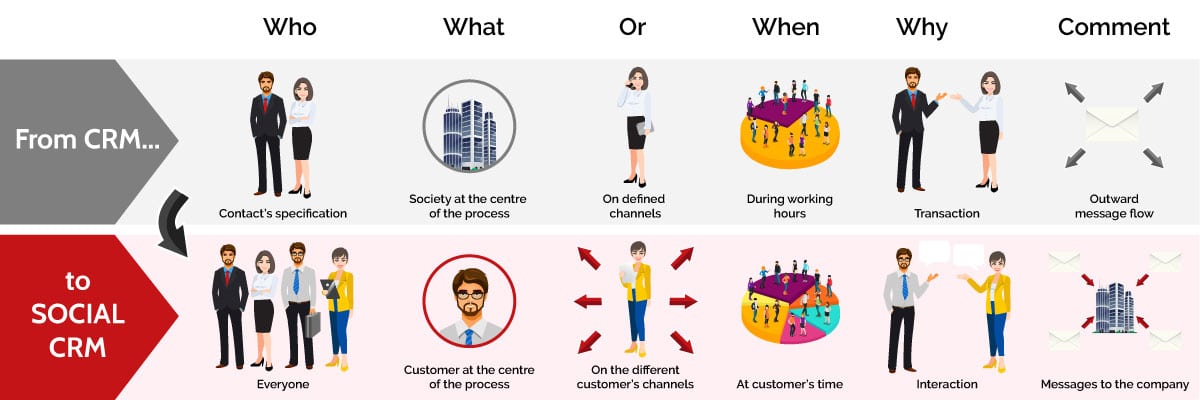With the rise of social networks, companies must now take into account a growing convergence between marketing strategy, customer relationship management and communication. Welcome to the era of social CRM!
What is social CRM?
Social CRM is a conversational marketing practice. Whether it is the use of social networks such as Facebook, Twitter, LinkedIn or Instagram, or by the commercial site of a company with the implementation of a ChatBot, the purpose is the same: to develop the link and proximity to customers.
Also called SRM (Social Relationship Management), Social CRM goes beyond the simple management of a community. The company is no longer at the convergence of exchanges but it is the customer who is placed at the centre of the interactions. SRM seeks to further personalize the relationship with the client and improve its understanding of it. A desire for proximity which implies always increasing the knowledge of one’s client in order to interact even better and, why not, to be able to anticipate customer’s desires and needs.
What model should you adopt in your business?
Of course, there is no such thing as THE unique Social CRM model. It is a concept to be developed and translated for each structure according to its size, sector of activity, audience, organization etc.
By placing the customer at the centre of its Social CRM strategy, the company’s ultimate goal is to develop trust and loyalty, but also to respond to the challenge of making the customer a brand ambassador. Therefore, if the customer places his trust in the company, what could be more normal for the company to place its trust in the customer by giving him such power.
We therefore no longer play only on the sole notion of loyalty through transactional or marketing bias, but through other notions more centred around the company’s commitment, participation and content creation. The company must learn to use its expertise by playing the transparency card.
How to switch from CRM to social CRM?
To switch from CRM to Social CRM, it is therefore not enough to use new social channels to reproduce old strategies. Pushing the same information from an emailing to Twitter, Viadeo or Facebook would even be strongly regarded by “networkers” as spam. Social CRM is more a question of approach to customer relations than a matter of channel.

Not sure that to offer promotional offers to its customers when they become fans of a company on Facebook, is enough to qualify this type of operations of “Social CRM”.
Directly reaching out to and actively involving the “customer” Internet user in the life of the company or in the co-creation of products (participatory marketing), this is an innovative approach within the scope of “Social CRM”. Beyond the inherent communication around this type of approach, above all it is about developing the privileged or close relationship between the company and its customers via a targeted tool.
What strategy is right for your business?
Even if today none of the Social CRM strategies implemented have been successful, all of them start from the principle that the customer must be considered as a stakeholder in the creation of value.
Without succumbing to the Twitter or Facebook effect, keep in mind that your business addresses multiple communities that do not belong to it.
A first pragmatic approach to Social CRM consists in setting up a charter and identified relationship management processes for all company departments by target, network, and / or by media. Therefore, employees create value for communities and feed networks while respecting the image of the company.
And you, how do you imagine using Social CRM in your strategy?

